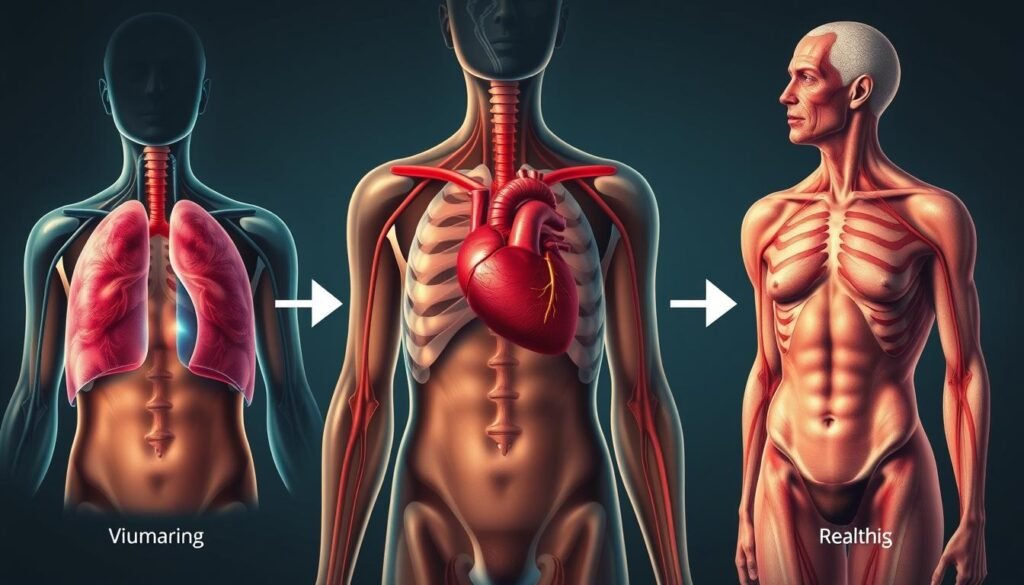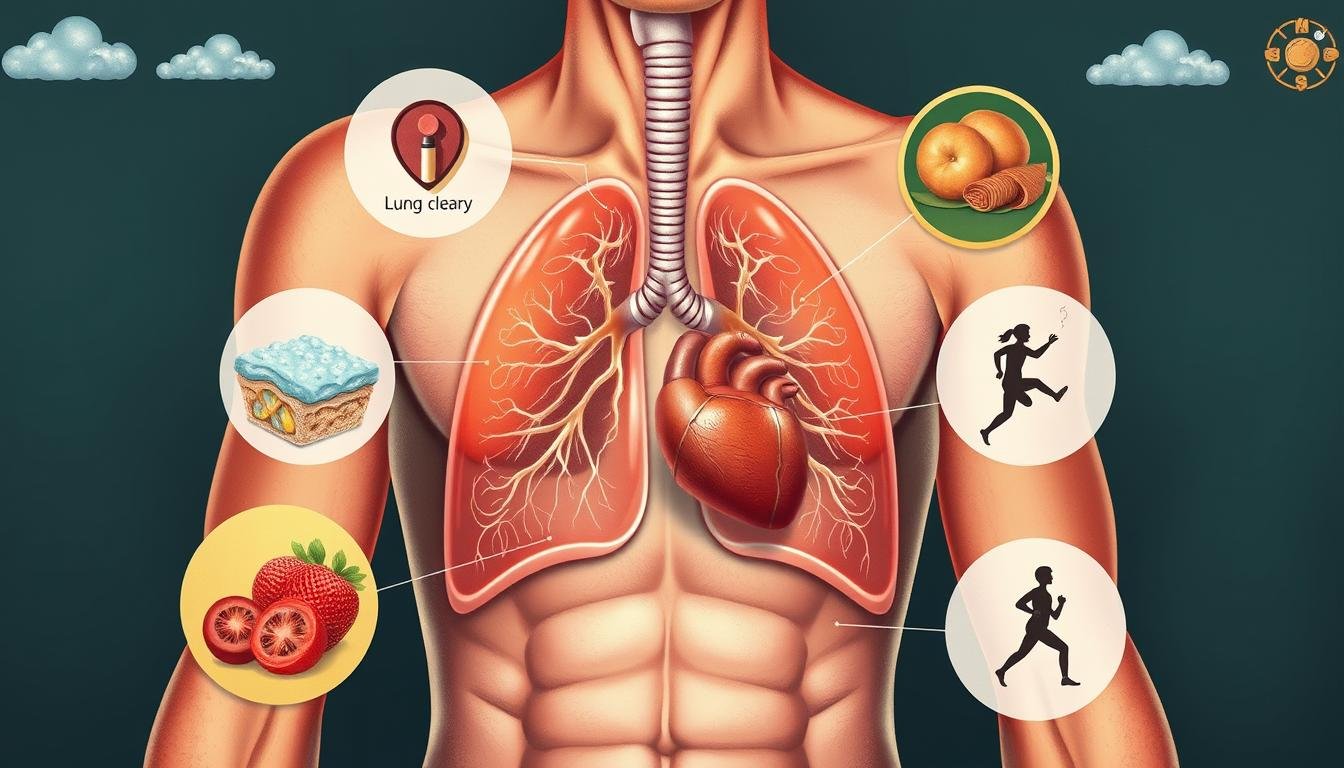Ever thought about how your body changes when you stop smoking? Quitting cigarettes starts a healing process in your body. It shows that the damage from smoking can be reversed. Knowing how quitting smoking helps your health gives you the confidence to start your journey.
Right after you stop smoking, your body starts to heal. Within 20 minutes, your heart rate and oxygen levels begin to get back to normal1. By the end of your first day without smoking, your heart attack risk drops a lot2. These quick changes are just the start of a long healing journey. Your body will keep changing for weeks and months, showing how strong your health can be.
Key Takeaways
- Quit smoking triggers immediate changes in your body.
- Your heart rate and blood pressure normalize within half an hour.
- The risk of heart attack decreases after just one day without smoking.
- Your sense of taste and smell improve significantly within two days.
- Health benefits continue to develop in the following weeks and months.
The Immediate Effects of Quitting Smoking
Deciding to quit smoking brings quick and positive health changes. One of the first things you’ll notice is your heart rate response. Just 20 minutes after quitting, your heart rate goes down. This is a big step towards lowering heart disease risk.
How Your Heart Rate and Blood Pressure Respond
Blood pressure also starts to get back to normal soon after quitting. This quick drop is key in reducing heart disease risks. As you stay smoke-free, blood flow gets better in 2 to 12 weeks. This boosts your heart’s health and fitness34.
Elimination of Carbon Monoxide
Quitting smoking also means your body quickly gets rid of carbon monoxide. In 8 to 12 hours, your blood carbon monoxide levels return to normal. This boosts oxygen levels and improves your health. After 48 hours, you’ll have the same carbon monoxide levels as a non-smoker. This means better oxygen for your organs and tissues34.
First Day Without Cigarettes
Your journey starts on the first day without cigarettes, a big step towards better health. Your body begins to change in many ways. Just 20 minutes after quitting, your heart rate and blood pressure start to get back to normal5.
After 12 hours, your body gets rid of more carbon monoxide and oxygen levels return to normal5. By the end of this day, your risk of having a heart attack starts to go down5.
Physical Changes in Your Body
On this first day, your body changes quickly and noticeably. Nicotine withdrawal can cause strong cravings5. But, your blood pressure goes down, and the risk of blood clots starts to lessen, which is good for your heart.
Dealing with Cravings
Cravings can be tough on your first day without cigarettes. Only 4 to 7 percent of people who try to quit cold turkey succeed6. So, finding ways to manage cravings is key.
Chewing gum, drinking water, or doing something you enjoy can help. Getting support from friends or online forums can also be very helpful. They offer encouragement and share their own experiences of beating cravings6.

The First Week: What to Expect
The first week without smoking is a big step towards better health. You might notice your breathing getting easier and your lungs working better.
Respiratory Improvements
As you get through the first week, your airways start to relax. This makes breathing simpler and helps you take in more oxygen. By the end of the week, you might find it easier to breathe.
This is because your lungs produce less mucus and your airways get less inflamed7. Your lung’s cilia start to heal too. This helps clear out mucus, making your breathing even better8.
Overall, your lungs might work better. This could mean less coughing and fewer lung infections in the future7.
Managing Withdrawal Symptoms
Withdrawal symptoms can be tough during this time. You might feel mood swings, have trouble sleeping, or get hungrier. It’s key to find ways to manage these symptoms.
Things like therapy or joining support groups can really help9. Remember, these symptoms usually last 2-4 weeks. But with the right help, you can get through them.
For more tips on dealing with withdrawal symptoms, check out some helpful strategies on managing your smoking cessation journey7.
Understanding the Quit Smoking Process On Your Body
Starting to quit smoking is a big step towards healing. It’s important to know how long it takes for your body to recover. Right after you stop smoking, your blood pressure can return to normal in just 20 minutes10. Every step you take towards quitting is a step towards better health.
The Healing Timeline
As you quit smoking, your body starts to heal in many ways. In 1 to 3 months, your circulation improves as your body fixes the damage from smoking10. This not only makes you feel better but also helps prevent serious diseases like heart disease and lung problems.
As time goes on, the benefits of quitting smoking grow. You’ll see a big drop in your risk of getting cancer and heart disease. Quitting smoking is a long-term investment in your health and well-being.
Long-term Recovery Benefits
Quitting smoking brings many long-term benefits. You’ll see a big drop in risks for heart disease and other smoking-related illnesses11. After 10 years without smoking, your risk of lung cancer halves10. Quitting smoking not only saves money but also greatly improves your quality of life.

Two Weeks of Being Smoke-Free
Reaching two weeks without smoking marks a big change. You’ll start to feel your body getting healthier. Your body’s blood flow gets better, helping your heart and muscles work better.
Improvement in Circulation
Two weeks without smoking makes daily tasks easier. Your blood flows better, bringing oxygen and nutrients to your body. This helps you perform better in physical activities and boosts your overall health.
Enhanced Lung Function
Quitting smoking also improves your lung function. You might breathe easier and have clearer airways. Your lungs start to work better, making physical activities less tiring.
For more tips on quitting, check out this link12. It has resources like quit smoking apps and counseling.
The First Month: Significant Changes
In the first month without smoking, you’ll see big health improvements. Your body starts to adjust to life without cigarettes. You might notice you cough less and breathe easier.
These changes are not just temporary. They show your lungs are healing and your breathing is getting better.
Decreased Coughing and Shortness of Breath
The first weeks without smoking are very beneficial. You might cough less as your lungs clear out mucus and toxins. This is a sign your respiratory health is getting better.
It improves your overall quality of life.
Regenerating Cilia in the Lungs
Cilia are tiny hair-like structures in your lungs. They help clear mucus and prevent infections. In the first month quitting smoking, these cilia start to regrow.
This regeneration helps your lungs fight off infections better. It’s a big step towards regaining your lung’s natural defenses.

Three to Nine Months: Continued Recovery
After quitting smoking, you might see big health wins, especially in lung function. You’ll find it easier to do physical activities because your stamina goes up.
Increased Lung Function
Studies show that lung function can jump up by 10% in this time. You’ll cough less and breathe easier. Your lungs start to heal, making breathing better1314.
Your body keeps getting better as it gets rid of harmful smoke. This leads to better lung health and more oxygen in your body15.
These changes can make your life better overall. You might find it easier to do physical activities. This lets you live more actively and feel more confident.
Doing things like running, walking, or cycling is good for your lungs and mind. It’s a win-win.
For more info on quitting smoking’s long-term benefits, check out this resource13.
One Year Without Smoking
Reaching one year without smoking is a big deal for your heart health. Your risk of a heart attack drops by half compared to a smoker. This shows how well your heart and blood system can recover16.
Knowing how your body benefits can keep you on track with quitting smoking. This not only makes you healthier but also boosts your physical abilities and overall well-being.
Reduction in Risk of Heart Disease
At the one-year mark, you’ll see many health improvements. The risk of heart disease starts to go down, and it keeps getting better after quitting17. Your body is naturally fixing itself after years of smoking. You’re not just protecting your future health; you’re also making your daily life better with each smoke-free day.

| Time Frame | Health Benefits |
|---|---|
| 20 Minutes | Circulation begins to improve |
| 1 Year | Heart attack risk is halved |
| 10 Years | Risk of lung cancer death drops to half |
| 15 Years | Heart attack risk equals that of a non-smoker |
Being smoke-free for a year is a huge win. It not only shows your personal victory but also leads to a lower risk of heart disease and better health16.
Understanding Nicotine Withdrawal Symptoms
Quitting smoking means your body has to adjust, leading to withdrawal symptoms. These can start as soon as 4 to 24 hours after your last cigarette. They usually peak around the third day and can last from days to weeks, depending on how long you smoked18.
Knowing about these symptoms can help you as you go through this tough time.
Common Symptoms Experienced
Many people face nicotine withdrawal symptoms. These can include feeling irritable or having a bigger appetite. Here are some common symptoms:
- Irritability and restlessness
- Headaches, which are quite prevalent during the first few weeks19
- Dizziness that often fades within a couple of days after quitting19
- Anxiety that typically begins around day three and can linger for several weeks19
- Brain fog that generally improves in a few weeks19
- Weight gain, with many people adding 5 to 10 pounds in the initial two weeks19
Strategies for Coping
Using good coping strategies can make dealing with withdrawal symptoms easier. Here are some tips:
- Try relaxation techniques like deep breathing or meditation to handle stress and anxiety.
- Stay active with regular exercise to boost your mood and cut down cravings.
- Join support groups to connect with others who face similar challenges.
- Look into Nicotine Replacement Therapy (NRT), which can help you quit by 50–60%18.
The Two-Year Mark: Increased Health Benefits
Reaching the two-year mark without smoking brings big health wins. Your body starts to heal and lower cancer risks. This includes a big drop in risks for cervical and throat cancer, making them as low as non-smokers.
As time goes on, you’ll see more of these benefits. Your body keeps getting better from the damage smoking caused.
Risk Reduction for Certain Cancers
Quitting smoking has a huge impact on cancer risks. Smoking causes about 30% of all cancer deaths and nearly 90% of lung cancer deaths20. Smokers are 20 times more likely to get lung cancer than non-smokers21.
After two years, the risk for throat, mouth, esophagus, and bladder cancers drops by 50% after five years of quitting21. Quitting before 40 can cut smoking-related death risk by 90%20. Quitting smoking is not just good for you. It also helps fight cancer for everyone.

Long-term Benefits of Quitting Smoking
Quitting smoking brings many long-term benefits that can greatly improve your life. You’ll see a big impact on life expectancy and overall health. Quitting smoking leads to many physical changes and lowers disease risks.
Impact on Life Expectancy
Smoking causes 8 million deaths each year worldwide, showing its huge impact on life expectancy22. Quitting smoking can greatly increase your life span. Former smokers see big drops in risks of deadly diseases like lung cancer, heart disease, and stroke23.
Most former smokers start seeing life expectancy benefits right after they quit. This marks a key moment towards a healthier life.
Overall Health Improvements
Quitting smoking leads to many health benefits. These include a stronger immune system and lower risks of chronic diseases like heart disease and lung problems. You also become less likely to get health issues linked to smoking, like better lung function and lower cancer risks23.
Former smokers also save a lot of money. They save about $1.4 million over their lifetime on smoking-related costs, like medical bills and lost wages22.
| Health Benefit | Benefit Type |
|---|---|
| Reduced Cancer Risk | Long-term benefits quitting smoking |
| Better Lung Function | Overall health improvements |
| Increased Immune Response | Health improvements |
| Higher Life Expectancy | Life expectancy impact |
In summary, quitting smoking is a game-changer for your health and life span2223.
Challenges During the Quitting Journey
Quitting smoking is tough, especially in the first weeks. People often feel withdrawal symptoms without nicotine. These symptoms include strong cravings, mood swings, and discomfort.
These feelings are usually worst in the first three days. They can make you feel anxious and irritable for weeks2425.
What Makes the First Few Weeks Difficult
Adjusting to life without cigarettes is hard. Nicotine cravings can start soon after you quit. They can last for days or weeks.
Feeling frustrated, angry, or irritable is common in the first week24. Being around smokers makes it harder. It’s important to know your triggers and how to handle them.
Maintaining Motivation
Staying motivated is tough in the first weeks. Having a clear plan and setting goals is key. Reminding yourself of the health benefits helps keep you focused.
Reaching small milestones, like a week without smoking, boosts your willpower. Support from friends or a counselor can help you get through tough times and deal with emotional challenges.

Support Resources for Quitting Smoking
Using different support resources can really help you quit smoking. These resources give you the guidance and motivation you need. You can find help through helplines, support groups, or professional counseling.
Using Helplines and Support Groups
Helplines, like the U.S. Quitline at 1-800-QUIT-NOW, are very helpful. They offer help in many languages, including Spanish and Chinese. This makes it easier for more people to get help26.
In Canada, there are toll-free numbers for English and French speakers. This makes it easier for people to find help26.
Support groups are great places to share your journey. They are run by local organizations. Being part of a group can make you feel supported and motivated27.
Many places, like hospitals, offer smoking cessation programs. These programs are designed to help you quit, whether you’re inpatient or outpatient26. There are also online programs like the Asian Smokers’ Quit Line28.
Using nicotine replacement therapies and medicines like Bupropion can help with cravings. You can get free help and counseling through services like Kick It California28.
Remember, quitting is a personal journey. Reaching out for help can make a big difference.
Combining support resources, medical assistance, and personal resolve creates the strongest foundation for quitting smoking.
Explore more on support resources for quitting262827.
Realizing the Mental and Emotional Changes
Quitting smoking does more than just improve your health. It also changes how you feel. As you stop using nicotine, you might start to feel happier and clearer in your mind.
Effects on Mood and Mental Clarity
When you first stop smoking, you might feel anxious or irritable. Nicotine withdrawal can lead to depression in many smokers29. You might also struggle with sleep, feel unmotivated, or tired. Finding ways to cope with these feelings is key29.
Exercise is a great way to help your mood. It releases happy chemicals in your brain, which can fight off depression29. Also, joining support groups can offer a lot of emotional support. Sharing your experiences with others can make you feel less alone29.
Using Nicotine Replacement Therapy (NRT) can make quitting easier by reducing withdrawal symptoms30. These methods help improve your mental health, showing why it’s important to care for both your body and mind when quitting.

| Aspect | Impact |
|---|---|
| Nicotine Withdrawal | Leads to depression and other negative emotional states |
| Physical Activity | Improves mood by releasing endorphins |
| Support Groups | Provides emotional support and shared experiences |
| NRT Utilization | Minimizes withdrawal symptoms, easing the quitting process |
Working on these mental changes helps you stay on the path to recovery. It improves your emotional health and stability in the long run29.
Conclusion
The journey to health from quitting smoking is both transformative and a sign of your strength. As you move through the quitting stages, you gain many health benefits. These include less risk of breathing problems and better lung function.
Studies show quitting can add up to 10 years to your life. It also cuts the risk of heart disease by half in 1-2 years31.
Every step you take shows your dedication to better health. Having support from friends, family, or groups helps a lot. It’s also key to know your triggers and set quit dates32.
Your body changes a lot when you quit. Nicotine levels drop to zero in 24 hours. Carbon monoxide levels get back to normal in a few days31.
While quitting is tough, the benefits are huge. With the right plan and determination, you can overcome the challenges. This way, you’ll enjoy the health benefits for many years33.
For more information, check out this detailed report.
FAQ
What are the immediate effects of quitting smoking on my body?
What should I expect on my first day without cigarettes?
How can I effectively manage cravings during the quitting process?
What improvements should I look for in the first week of quitting?
What is the quit smoking healing timeline?
How does quitting smoking affect my lung function?
What happens to my risk of heart disease after one year of being smoke-free?
What symptoms can I expect from nicotine withdrawal?
How does quitting smoking affect my cancer risk after two years?
What are the long-term benefits of quitting smoking?
What challenges should I expect during the quitting journey?
What support resources are available to help me quit smoking?
How does quitting smoking affect my mental and emotional state?
Source Links
- https://www.medicalnewstoday.com/articles/317956
- https://www.webmd.com/smoking-cessation/what-happens-body-quit-smoking
- https://www.healthline.com/health/effects-of-quitting-smoking
- https://www.nhs.uk/better-health/quit-smoking/
- https://www.verywellmind.com/after-you-quit-smoking-the-first-two-days-2824391
- https://www.lung.org/quit-smoking/i-want-to-quit/what-to-expect
- https://www.solutionhealth.org/a-timeline-of-what-happens-after-you-quit-smoking/
- https://www.verywellhealth.com/what-happens-when-you-quit-smoking-7561262
- https://www.marylandphysicianscare.com/frc/what-happens-when-you-quit-smoking/
- https://health.clevelandclinic.org/happens-body-quit-smoking
- https://my.clevelandclinic.org/health/articles/17488-smoking
- https://besmokefree.com.au/what-happens-to-your-body-the-moment-you-stop-smoking/
- https://www.verywellmind.com/after-the-last-cigarette-how-your-body-heals-2824388
- https://www.orlandohealth.com/content-hub/how-the-lungs-heal-after-quitting-smoking/
- https://www.healthline.com/health/smoking/why-you-may-feel-worse-several-months-after-quitting-smoking
- https://www.nhs.uk/better-health/quit-smoking/why-quit-smoking/benefits-of-quitting-smoking/
- https://www.inspirahealthnetwork.org/news/healthy-living/what-happens-your-body-when-you-quit-smoking
- https://www.medicalnewstoday.com/articles/323012
- https://www.webmd.com/smoking-cessation/understanding-nicotine-withdrawal-symptoms
- https://pmc.ncbi.nlm.nih.gov/articles/PMC3927319/
- https://www.lompocvmc.com/blogs/2021/september/how-long-does-it-take-the-lungs-to-heal-after-qu/
- https://www.paho.org/en/more-100-reasons-quit-tobacco
- https://www.ncbi.nlm.nih.gov/books/NBK555590/
- https://www.cancer.gov/about-cancer/causes-prevention/risk/tobacco/withdrawal-fact-sheet
- https://www.gatewayfoundation.org/blog/dangers-quitting-smoking-cold-turkey/
- https://www.heart.org/en/healthy-living/healthy-lifestyle/quit-smoking-tobacco/help-i-want-to-quit-smoking
- https://www.cancer.org/cancer/risk-prevention/tobacco/guide-quitting-smoking.html
- https://smokefree.ucsd.edu/resources-to-quit/index.html
- https://www.niquitin.co.uk/quitting-smoking-and-depression/
- https://www.brainsway.com/knowledge-center/what-happens-when-you-quit-smoking/
- https://www.cdc.gov/tobacco/about/benefits-of-quitting.html
- https://kidshealth.org/en/teens/quit-smoking.html
- https://www.heart.org/en/news/2019/11/15/quitting-smoking-could-lead-to-major-changes-in-gut-bacteria


